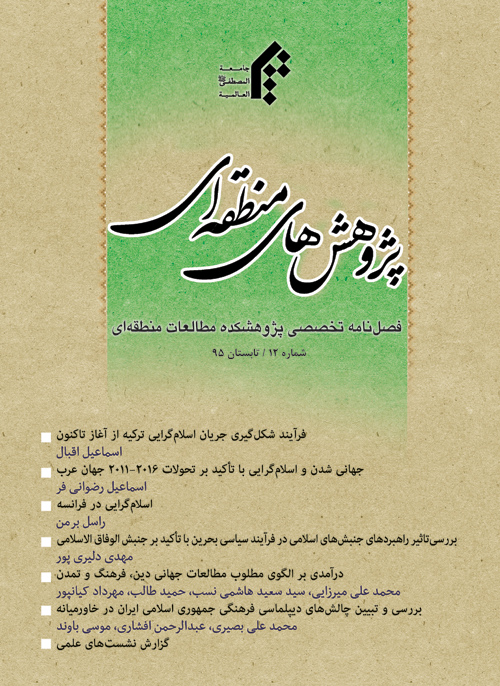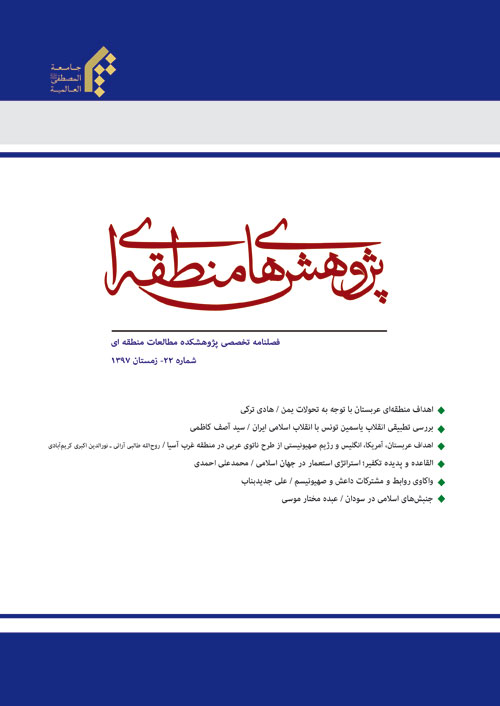فهرست مطالب

فصلنامه پژوهش های منطقه ای
سال چهارم شماره 12 (تابستان 1395)
- بهای روی جلد: 30,000ريال
- تاریخ انتشار: 1395/06/20
- تعداد عناوین: 10
-
صفحه 9
-
صفحه 83
-
Page 21The rise in Islamism following establishment of secular regime in Turkey and its development in an anti-religion system are the main concerns of this article in order to show how structural changes in recent decades had some effects on the growth of Islamism in this country. Using an analytic-descriptive method, the aim of this article is to answer these questions: How did the changes in economic and political structure of Turkey, from establishment of a secular regime to the time Justice and Development Party took power, affect the emergence and development of Islamism? What are the main causes of change in Islamisms approach from idealism to pragmatism in last decade? The findings indicate that Islamism emerged in Turkey as an idealistic and ideological discourse in contrast to secularism, but gradually its approach changed to pragmatism in convergence with it.Keywords: Islamism, idealism, pragmatism, secularism, Turkey, Justice, Development Party
-
Page 55The protests against regimes since 2011 were considered as a new movement in Arab world, which was against the trend of political thought in this region since it poses a new reading of traditional elements in modern times. All societies are faced with the phenomenon of globalization as an undeniable fact which brings opportunities and threats to all schools of thought. Western liberal democracy is aided by globalization to be expanded geographically. Arab revolutions should be considered in the context of this process too. Here the question is: How does globalization affect the orientation of Islamism, especially in relation to Arab worlds changes of 2011-2016? In this article the claim is that globalization paved the way for Islamic movements which were evident in the developments taking place recently in Arab world but, at the same time, it led to some changes in the attitude of Islamist elites of Arab world. Political Islam was one of the main readings of recent changes in this region.Keywords: Arab world, globalization, modernity, political Islam
-
Page 83Western observers usually intend special meaning for Islamism according to which development of Islamist movements is interpreted as a serious threat to secular governments. According to this interpretation, Islamist is used to refer to extremist movements, groups and individuals which subscribe to religious values and ideals to serve a larger political agenda aimed at violently spreading or imposing special reading of Islamic law, either locally, regionally or internationally. This conception of Islamism is used by the author to investigate the phenomenon at three levels in France: Islamist organizations, Islamism and society and the relations between Islamism and government.Keywords: France, Islamist organizations, Islamism in society, Islamism, government
-
Page 108This article, using an analytical-deductive method, considers Islamic movements of Bahrain and their strategy, especially after the revolution in February 14, 2011, trying to address this question: In spite of absolute public support of opposition movements and the growing dissent against the Āl Khalīfah regime, why has the strategy of these movements failed to bring about the fall of the regime and reforms as demanded by opposition groups, as well as any reduction in the systematic suppression of Shii majority and religious apartheid? To answer this question, the significant point is that reactionary countries in the region support suppression of protests and silencing of leaders by Āl Khalīfah dynasty, but this article claims that these movements failed to have a single strategy in order to mobilize public protests. This failure, as an Achilles heel, weakened the goals of the uprising that was launched in February 14.Keywords: strategy of Islamic movements, Shias of Bahrain, Āl Khalīfah dynasty, Al-Wefaq National Islamic Society
-
Page 142The main task of Al-Mustafa University to educate people from different nations necessitates true understanding of cultures as well as background of the civilizations associated with different societies. This understanding is impossible to achieve without a theory and illustration of kind and level of suitable approach. A critical review of theories and studies of international arena indicate the influence of western meta-theoretical discussions and specially hegemony of secularism even in Islamic world. On the other hand, relevant literature in Islamic world and Iran is mainly concerned with political approaches. In this situation one can ask: What is the appropriate model for studies of religion, culture and civilization? This article is a prologue to articulate this model. The claim here is that this suitable pattern of studies should be defined in two macro-levels: (1) referring to Islamic ideas and setting general goals and (2) considering a model to study religion, culture and civilization in modern world. The relationship between these two levels shapes the appropriate model of study (hypothesis). This article is based on practical wisdom and Ilm al-Kalam (Islamic theology) which explains the concepts and theoretical basis of this model (method).Keywords: International Studies, model of study, religion, culture, civilization
-
Page 175Nowadays cultural diplomacy is one of the most effective elements in countries foreign policy. In today's political world cultural diplomacy is referred to as the soft power which means using cultural tools and mechanisms to introduce and transfer the culture and civilization of a country to another country and culture. Iran due to its civilizational, historical, cultural and religious background potentially owns the soft power tools. Despite this potential, Iran is faced with challenges in its relations and interactions with the Middle East countries and promoting cultural diplomacy. Therefore, this study tries to address this main question: What are the challenges which Irans cultural diplomacy in the Middle East faces? The main assumption of this paper is that Irans cultural diplomacy is faced with several challenges such as Shiaphobia and Iranophobia and so forth.
The findings suggest that anti-Iran and anti-Shiites sentiments, Wahhabis propagation, pan-Arabism, Cultural globalization, identity politicization, Turkeys cultural influence in the new form of Ottoman agenda and also Media and cultural influence of the west especially America are of the most important cultural and diplomatic challenges of Islamic Republic of Iran in the Middle East. Research method is descriptive analytical using library tools.Keywords: The Islamic Republic of Iran, cultural diplomacy, culture, Middle East, Soft Power


